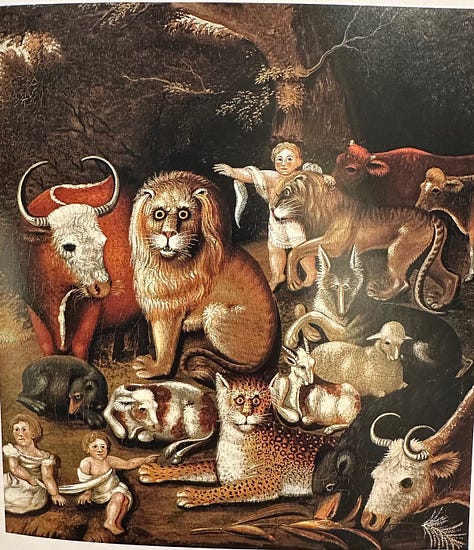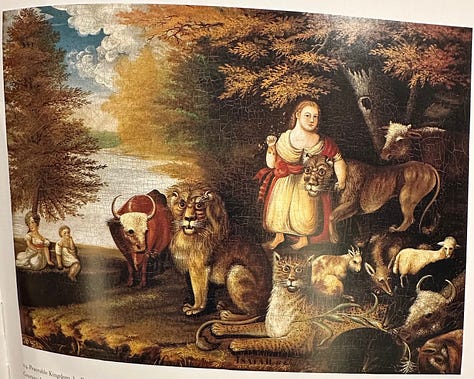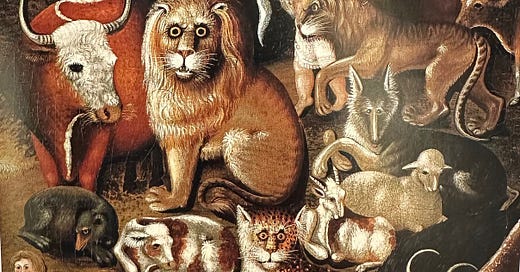Several years ago while I was working on this poem, I was talking to my friend and pastor David about the passage in Isaiah 11 where the lion shall eat straw like the ox. “I don’t know what to make of that kind of heaven,” I said. “Lions aren’t lions if they eat straw.” Now, I know what a metaphor is. Isaiah was speaking of other things. Kingdoms who clashed with other kingdoms suddenly laying down their weapons in peace. But I couldn’t get past the literal image of the lion and the ox. Even if Isaiah was talking about kingdoms at war, then surely each of those nations have defining traits that made them what they are. A lion is good as a lion. China or France or Sudan or the United States are good as those nations. Surely my enemy is good otherwise Jesus wouldn’t have told me to love them. The next time I saw David, he brought me a copy of The Kingdoms of Edward Hicks by Carolyn Weekley.
Hicks, if you don’t know, was a Quaker painter who lived in the new colony of Pennsylvania. He thought very highly of William Penn. I won’t go into all of the details about Quaker theology and by extension politics (because I don’t know that much), but I thought it was incredible that Hicks—who the Rockefeller museum collectors called a folk artist—spent his life attempting to paint the scene described in Isaiah 11. He painted at least 62 known versions of this scene. Sometimes it’s just the animals. Other times, its the animals in the foreground while William Penn brokers a treaty with native Americans in the back.
I don’t know how much influence Hicks had on the poem, but the fact that he kept approaching the mystery of that scene, over and over, throughout his entire life was something to behold.



Poems are made of poems though, both in content and in sound. I’ve included links in the text to other poems that have found their way into this poem. To speak metaphorically, like Ezekiel and John, when you eat a text, it becomes part of your flesh. To speak literally, when you speak a poem, it becomes a part of your muscle memory. To speak of the lion and the ox, well, I still don’t know.
Hawk Lies Down with Rabbit
“...the lion shall eat straw like the ox.” - Isaiah 11:7 “Is this what it’s like...a little blood here, a chomp there...must everything whole be nibbled?” - Annie Dillard Hawk’s hooked beak clips Rabbit’s spine, clips her screech. Rabbit rolls her eyes to see a strip of her own twitching meat worm free through her ripped pelt-pleat like a maggot sprouts from a spilt gut, or a playful lover teeth-tugs a lower lip. For a moment she has the same terrible vision as Hawk atop a thermal loft: the navel topos of the crops; the axised earth eastchasing the sun, convexing tantric like the deep-heaving breasts of day, or the onion uncellaring of death’s undominion. To refuse this little death would set the centrifuge askew: A peach-stone could not sprout through hawk-scat pellets of rabbitfur refùse— and thus rèfuse the green fuse, undriving the blossom, denying Rabbit’s son the nibble of peach nodes under skies starved of starved Hawk shadows. Death eats with three stomachs. Am I resolved to believe that Hawk’s hooked beak will sometime be hammered into Hummingbird’s flute? Could we all be sustained on the nectar of a peach clinging to a tree?















Share this post